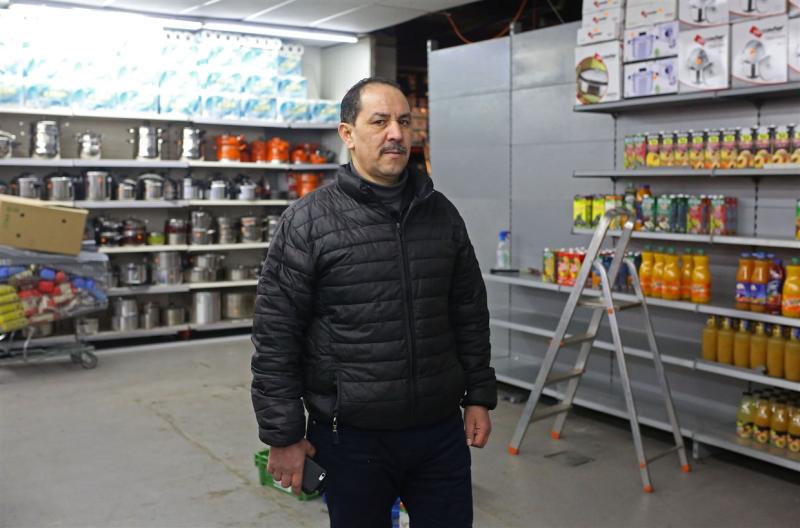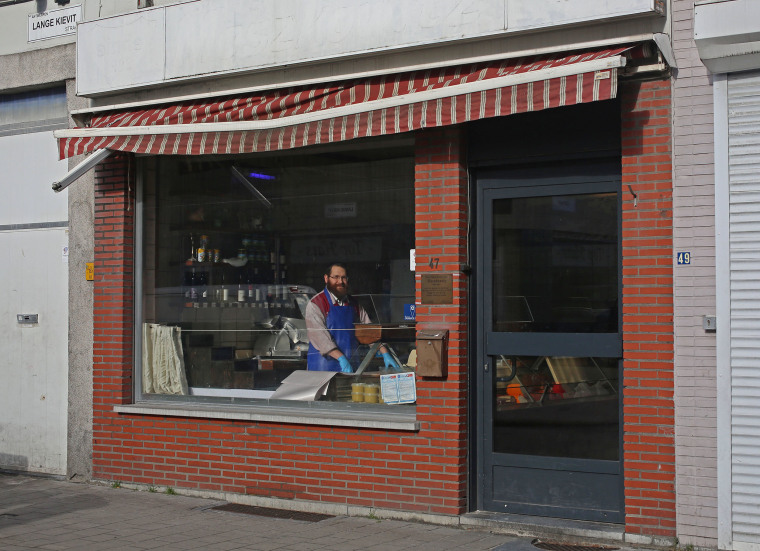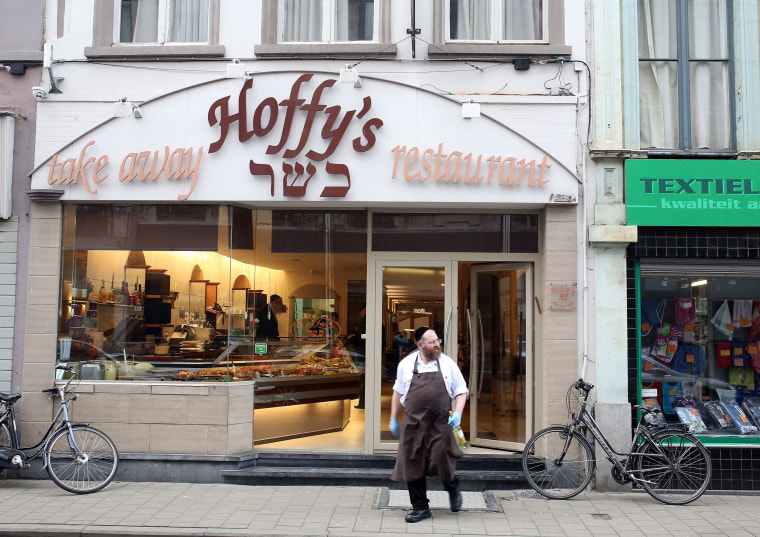Ritual animal slaughter law leaves Belgium's Muslims and Jews facing shortages, price hikes



BRUSSELS — Workers put the finishing touches on a wall of newly installed shelves at a small grocery store. Three months ago, the same wall was lined with a row of refrigerators filled with halal meat.
But a new law in the Flanders region of Belgium bans the practices required for both halal and kosher meat. That has meant such products have become harder to find and more expensive in recent months.
“I stopped selling meat because I don’t want to sell meat that’s not halal,” said Bouihrouchane Mbark, the owner of the Aswak Souss supermarket in Brussels.
The Jewish and Muslim communities have united in opposition to the ban.
With the help of an American legal fund, a group of Muslim and Jewish organizations have taken legal action and hope to overturn the new law. The Belgian Constitutional Court heard their arguments in January and is expected to rule on the case within weeks.
The groups say that the new regulation infringes on their civil rights, preventing them from freely practicing their religion.
“Jews and Muslims are vulnerable minorities in Belgium and this decision stigmatizes these minority groups,” said Joos Roets, the lead council for the Executive of Muslims in Belgium, and the Belgian Coordination Committee of Islamic Institutions, two organizations involved in the lawsuit.
Belgian law had long required animals to be stunned before slaughter to prevent unnecessary pain. It did, however, grant an exception for ritual slaughter, a practice in Islamic and Jewish religious laws in which the animals are not stunned first. Both halal and kosher slaughter require the use of a very sharp knife to slit the animal’s throat in one stroke and sever the major structures and vessels.
The new law in Flanders came into effect in January removing the religious exception. In the Wallonia region, a similar law will come into effect at the end of August.
 Halal meat is difficult to find at outlets like Aswak Souss in Brussels since a new law requiring pre-stunning of animals came into effect. Susannah Ireland / for NBC News
Halal meat is difficult to find at outlets like Aswak Souss in Brussels since a new law requiring pre-stunning of animals came into effect. Susannah Ireland / for NBC News Mbark estimates that his supermarket's sales have shrunk between 40 and 45 percent due to the ban.
“There used to be lines at the cashiers, now they are almost empty. People would come for meat and leave with all sorts of other things,” he said.
Many Muslims feel the laws are a result of Islamophobia rather than a concern for animal rights. For Jews, they are also an uncomfortable reminder of a darker period in European history. In 1933, one of the first laws the Nazis enacted was a ban on kosher animal slaughter.
Belgium isn’t the first European country to prohibit ritual slaughter without stunning. Sweden, Norway, Iceland, Denmark and Slovenia have banned exceptions for religious killing, while Switzerland and Lichtenstein make an exception only for poultry.
Belgium is home to larger populations of both Muslims and Jews, who fear that the restrictions on ritual slaughter could spread further throughout Europe. There are around 500,000 Muslims in Belgium and 30,000 Jews.
Antwerp is home to one of the largest Jewish ultra-Orthodox populations in Europe.
The Jewish community has long imported beef and lamb from slaughterhouses in France, Hungary and Poland, but the new law forced the closure of a poultry producer just outside of Antwerp.
 Antwerp-based kosher butcher Chaim Goldberg said the wholesale price of chicken has increased around 50 percent. Susannah Ireland / for NBC News
Antwerp-based kosher butcher Chaim Goldberg said the wholesale price of chicken has increased around 50 percent. Susannah Ireland / for NBC News At the small Moszkowitz kosher butcher in Antwerp, the change in legislation has meant an approximate increase of 50 percent in the wholesale cost of chicken. The shop has absorbed the financial hit, preferring to keep prices the same until after the court verdict comes in.
If the community loses the suit, then the shop will likely increase prices by at least 20 percent.
“If it stays this way it will be a big problem, but hopefully it won’t take long for the law to be thrown out,” butcher Chaim Goldberg, 32, said.
Some Muslim shop and restaurant owners have now also started importing meat from other European countries, though given how recent the law is many are still working to find suppliers.
The case has attracted attention from Jewish and Muslim communities outside of Belgium, who hope that a victory will stop other European countries from enacting similar laws.
“Time and again, the Jewish community is told by senior E.U. officials that there is no Europe without the Jews. These bans undermine those statements and put Jewish life at risk,” Chief Rabbi Pinchas Goldschmidt, president of the Conference of European Rabbis, said in a statement.
The Jewish community’s legal efforts have been assisted and partially funded by the New York City-based Lawfare Project , a legal fund and civil rights organization that works around the world.
“We don’t think these types of laws belong in modern society, and a state should not be able to restrict the free religious practice of minority communities,” said Brooke Goldstein, the founder and director of the Lawfare Project, whose fund has supported other civil rights cases involving both Jews and Muslims in the United States and Europe.
If the Muslim and Jewish groups lose their lawsuit, they plan to take the case to the European courts.
Despite the strong objections of both minority communities, the politician who introduced the legislation in Flanders insists that religion shouldn’t exempt anyone from the country’s laws.
“Our convictions concerning animal welfare go above religious insights. Why should [religion] give you more rights?” said Ben Weyts, the Flemish Parliament’s animal welfare minister.
 Hoffy's kosher deli and restaurant in Antwerp, Belgium. Susannah Ireland / for NBC News
Hoffy's kosher deli and restaurant in Antwerp, Belgium. Susannah Ireland / for NBC News Responding to criticism that the law was politically motivated or anti-Islam, Weyts maintains he was inspired by animal welfare concerns alone.
He would eventually like to see the European Union adopt similar legislation, which is widely supported by animal rights advocates.
Though the law makes ritual observance harder, members of both the Jewish and Muslim communities have no immediate plans to leave Belgium.
“Where’s better?” said Benjamin Hoffman, the owner of Hoffy’s, a kosher deli and restaurant in Antwerp. “This is a great community. Life here is good. If there’s an E.U. law against ritual slaughter, then we will have problems.”




When the state interferes with the right to practice your faith or animal activism? Does one trump the other?
I think that the supreme courts ruling in regards to polygamous marriage showed that religious freedom is not unlimited. I think secular law would ultimately trump religious freedom if this were a case of truly cruel and unusual punishment, but not stunning the cow or goat before its killed doesn't seem to meet that definition. No religion is intentionally torturing or tormenting the animal in order to keep their religious traditions. I have my doubts that bashing it with a club is any more humane than a quick neck slice and allowing the blood to drain. Most of methods for kosher or halal animal preparations have to do with a quick, clean kill and fully draining the body of the blood which is considered sacred. But they have nothing to do with intentionally making any animal suffer which is where I think secular law would be able to step in. So while I think no animal abusers should be able to hide behind the veil of religious freedom, I don't think hassling Muslims and Jews about their ancient religious traditions in regards to food prep is a wise use of government resources and just makes them look bad.
Dear Friend Dismayed Patriot: Well written and presented.
For those who have an ideological problem with Kosher or Halal, don't eat it.
They get to decide for themselves, not for anyone else.
Live and help live.
P&AB.
Enoch.
I have to agree with Enoch. Well said.
Dear Friend Perrie: For all the reasons supplied by our good friend Dismayed Patriot below and more, let each practice their heritage as the Spirit moves them. Free of governmental interference.
We have seen historically that first restricting Kosher and Halal, then other practices by non-members of the group leads to discrimination, and ultimately violence.
Once the state can be manipulated by nefarious groups with evil intentions, it is easier to view the "others" as less than human, who have no rights to do as they choose among themselves.
Kashrut is more stringent than Halal. All Kosher food is Halal. The reverse not always true.
They are at the high level both analogous.
In each case they deal with spiritual purity.
Both for the human consumer, and for the animal protein source provider.
I have no problems with vegans demonstrating and making their case for meat and dairy free diets.
Mrs. E. and I lean that way ourselves, in our Geezerhood.
The choice is still up to the individual, not the government.
Ah, freedom of choice.
It serves the needs and interests of animal rights advocates more in their lives than restricting what others do through misuse of governement.
P&AB (And a Kosher Corned Beef Sammie on a Bialy with Sharp Deli Mustard (Ba Tempte) Romaine Lettuce and Beefsteak Tomato Slice).
Enoch.
Sounds good to me Enoch, I'll take two with some chips on the side.
Well said Enoch.
The truth is, if you don't want to eat meat, than don't. But slaughter is slaughter and none of it is pretty. This is meant to please some and take away religious freedom from others. I'm not cool with that.
Reading the story I have to wonder if the constitutions, if there are any, of these country's protects religious rights like ours does.
Galen,
We happen to have our constitution and that is why I value it so much. So no, most other countries do not.
Belgian Constitution :
All Western democracies have freedom of religion.
This is the part that the Belgian government is counting on to pull this off, they are making the ritual slaughter of animals an "offense".
Could be.
I find it all rather hypocritical. There isn't much logic, anywhere in between carnivore and vegetarian.
And then... plants are living things, too.
Neither Islamophobia nor antisemitism could be a factor since both religions are being treated the same, or else they both are. So what's next?
Dear Brother Buzz: Probably making other laws preventing both traditions from practicing our own.
Nothing new here.
One way to address this is to make a law that any "animal rights activist" who makes laws preventing anyone from practicing their religion has to eat a Bacon Double Cheese Burger with Lard deep fried potatoes and a milkshake not Kosher or Halal three times a day until the law the got passed is repealed.
Good for the goose, good for the gander.
Enoch, (Being a Plant Rights Activist).
Nah, just make it a lard sandwich with a side of lard fries and, a lard milkshake. YUM.
Then this should be right up your alley. LOL
Dear Brother Buzz: I am all in.
Great signage.
E.
While I doubt the animals suffer much more one way or the other I wonder if there's a difference in Worker Safety. Having to slice the throat of an un-stunned animal could allow reflexive struggling by the animal that could injure the worker. Even if you're behind a barrier you still have to reach your arm in there with a knife in your hand, I'd think wrist injuries would be common. I imagine the added risk could be managed. I also wonder about employment opportunities, are non-Jewish and non-Muslim's allowed to work in production of halal and kosher meats ?
Dear Friend Zuksam: I called a friend in the local Muslim community who supervises Halal.
He confirms to me that with Halal, as with Kashrut those trained and supervised in how to ritually slaughter domesticated animals for spiritual purity do not get injured any more than those who do not follow a religion, but work at meat processing plants.
Often the non-religious workers have greater injury risks.
Commercial operations cut corners for wider profit margins at worker risks.
Mashgichim (Kosher) and their counter parts in Halal may not cut corners when they supervise.
Having served as a Mashgiach for meat, dairy and wine production non-Jewish workers can be employed if trained and supervised in follow religious law and in the USA OSHA guidelines.
In the case of Kosher for Passover (Arba'ah Cosot) sacrimental wines, using tubes so the wines are not visible side steps the Yayin Chesik Halachic stricture.
That is an obscure reference, but it matters to us around spring time.
For observance of relevant religious law, you need a Rabbi or Imam as relevant.
For among other reasons, spiritual purity of food stuffs, safety and minimal discomfort of livestock, and human religious freedom rights activism.
Good post Zuksam.
P&AB.
Enoch.
I believe that any one should be able to follow their religious rights as their religion lays them out, this include all Kosher and, Halal practices but, then again, I have an ulterior motive for this, I love Kosher foods.
Here is a corned beef on rye with a potato pancake and a pickle. Enjoy!
It's okay as long as you stick to the Kosher "K" rations: Kugel, Kreplach, Kishka, Knuckers, Kefilte fish, Knishes, and Korned beef.
I'll take the Korned beef, you can have the Kefilte.
That's okay with me. I'll trade you a dill pickle for some red horseradish.
The subject of "food animals" is... not simple. These creatures would not exist if we didn't intend to eat them. But then our conscience compels us to slaughter them gently.
How absurd is that?
Some people think God is preoccupied with our methods of slaughtering the animals we eat.
How absurd is that?
If we don't destroy the world in the meantime, I suspect that we will consume perfectly balanced, entirely artificial foods in a couple hundred years.
I did say " entirely artificial ".....
Well, you are forgetting there are a lot of people out there that have had "plastic" surgery.
Dear Friend Bob Nelson: At least in the matter of Kashrut, the emphasis isn't on what concerns G-d.
It is on how we live our lives in relationship to other life forms, and the effect that has on our character.
Proponents of Halal should address their ways by and for themselves.
I am not well enough versed to be sure I am saying what they do justice.
The basis for all Kosher (spiritual purity) laws is this.
"Asur levashel egel bah chalav emmo".
"It is forbidden to boil the baby goat in the milk of its mother".
In desert climes world over animal milk is used as a beverage and a cooking fluid when fresh potable water is not available.
We need to do what we need to do to sustain ourselves.
All the more so in climates and locales where food, cooking and hydrating fluids are scarce.
That said, we should not disrespect the life forms which sustain us.
It is considered conduct unbecoming to boil an animal in the milk of its own mother.
In all the complexity of Kashrut the underlying principle is to keep us cognizant of the effect our conduct has on the life forms around us.
That is far from absurd.
It is best to research and know what one writes about, so as not to disrespect the ways by which others live.
The alternative is to mock the humanity shown by the customs and traditions of others via ignorance of them.
P&AB.
Enoch.
I understand that many religious laws are originally sanitary concerns. That's my problem.
While these rules may have been a good idea thousands of years ago, they are pointless today. This is a bad thing, because thinking about God is difficult enough, and hardly needs pointless complications.
IMNAAHO, we need to simplify our perception of God... and kosher ain't simple...
We should explain that forbidding the boiling of an animal in the milk of its mother is the reason for not mixing dairy products with meat products in the same meal, i.e. one must not drink a glass of milk when eating a corned beef sandwich - there should be a time separation between doing so.
I prefer a glass of ice tea with my corned beef sandwich.
My choices would be Dr. John's Diet Cream Soda, or Verner's Diet Ginger Ale.
Unfortunately both bloat me.
Correct.
E.
I don't get it anyway. Why does it matter how an animal is killed, it is dead. Meat is meat. If one is hungry enough, it will be eaten regardless.
A few thousand years ago most pigs carried trichinosis. It was wise to forbid its consumption. And the ban was all the more likely to be respected if it was the command of God!
All the alimentary rules have the same sort of explanation. Of course... the conditions that existed then are no longer applicable.
Thanks.
Sounds to me that it is basically just a tradition.
Not innocent, though. Lots of people get very hung up on now-pointless rules that may have once made sense, while ignoring Christ's Greatest Commandment: "Love God and your fellows".
The fundies' virulence is harmful
And, they also said Measles was eradicated.
Who said that? Were they really so foolish as to use no qualifiers at all?
I hear things and, then I go looking, it helps.
Ummmmm........
Yep, this has always been the situation, that's why we get vaccinated before going overseas but, what I'm talking about in the article is the fact that they said it had been eradicated in the U.S., except we now have an epidemic in Oregon and, Washington state.
It had been eradicated. Then a tourist brought a few germs home, to be joyously welcomed by unvaccinated kids.
All I know is, at one point the CDC said it had been eradicated in the United States and, here it is again in epidemic proportions in Oregon and, Washington and, a few other states because people decided their kids didn't need to be vaccinated against it, I've had Measles, Rubella, Mumps and, Chicken Pox and, none of them were fun. People who don't vaccinate their kids today should be brought up on charges of child abuse and, have their kids taken from them.
Now, can we get back to the fun topic of animal slaughter?
True.
Not true, when you kill an animal, a fast kill v. a slow kill can make the difference between tough meat and, tender meat, the faster the kill happens the less chance the animal has to tense up and, make the meat tougher to chew.
Ahhh that must be the reason roast I made Sunday was tough, it was tense when killed. Nothing to do with my poor cooking, whew.
LOL, it could also be that there wasn't enough "marbling" in the meat, the fat content of the meat helps to keep it tender. There are several factors to look at when buying beef.
Maybe the toughness differs from cow to cow. I've had Kosher roast brisket that I could easily cut with my fork.
Dear Brother Buzz: To reduce tension they now do group therapy on poultry.
Its known as KY Freud Chicken.
Col. Enoch
Oh my.....now that is just hilarious.